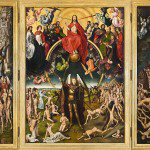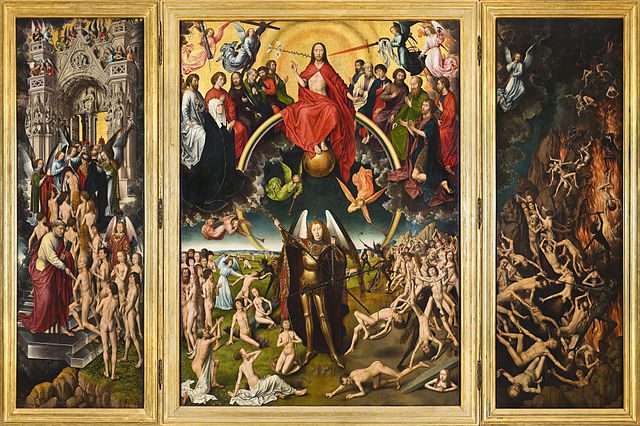. . . and Denigration of the Reliability of Holy Scripture

(11 January 2000)
***
The “agony in the garden” scene has several manifestations in the Gospels: In Luke it occurs on the Mount of olives; in Matthew it occurs at Gethsemane (probably the same exact place: “gethsemane” means oil press); in Mark, it is also Gethsemane; in John it is a garden, again in the Kidron valley and very likely Gethsamene. In the first three accounts there is no garden, but anguish and agony; in the last there is a garden but no agony [Lk.22:39-44; Mt.26:36-40; Mk.14:32-37; Jn.18:1-11].
Obviously the Bible writers contradict themselves, then. No doubt the contradictions were added to the Bible later by zealous Christians who anxiously awaited the arrival of the higher critics.
The witnesses and evangelists all deal variously with the nature of Jesus.
More contradictions, showing the “human nature” of the Scripture over against its Divine (Inspired) Nature. But of course God wanted the human element to be in the forefront.
This is good scriptural evidence for the fully human nature within the hypostatic union. We must connect with Jesus here in a visceral way. He is suffering and agonizing to the point of death. There is little to suggest that these accounts are unhistorical; this happened.
Yes, but we can’t trust these accounts, because they were added later in order to emphasize Jesus’ humanity. We must accept only the passages stressing Christ’s divinity as authentic, deriving from the Petrine “Q” etc.
And it is totally absent from John. Why? Is John a bad historian? Does he deny the humanity of Jesus?
Naw; if he could just be left on his own without all these darned later additions, he would have done a fine job . . .
Suffice it to say that John’s goal is different from the Synoptic. Whereas the latter seek to show us the essence of human suffering of abandonment and betrayal, the former seeks to show the Divine in hypostatic union with the human.
There you go again! Can’t you see that this is a proof of later additions? Otherwise, John would ignore the humanity of Jesus and stick to the Divine . . .
The synoptics show us a Jesus struggling with his fate, petitioning God; John shows us a Jesus, not struggling but sedate in knowledge of victory, in control of all events, demanding their unfolding. Are these two different Jesuses?
Yes (now you’re beginning to catch on!). We know that when the Bible talks about the Divinity of Jesus (i.e., Monophysitism), it is inspired; when it discusses His humanity, these are later gratuitous additions, put in by zealous Chalcedonian or Nestorian scribes who wanted to corrupt the historical portrayal of Jesus with their own Greek mysticism and preconceived notions . . .
At Chalcedon these issues were resolved in a very Greek and mystical way; this is how we understand Jesus today.
Gee, what a shame, eh? Too bad these infallible councils were chained to an outmoded way of thinking. If only the higher critics had been there! They would have avoided these pitfalls . . .
There are scholars who would argue that references to this or that were added before this or that event. That may indeed be the case.
Of course it is the case! Haven’t you read what I just wrote yet? Don’t question the higher critics! They are clearly inspired, and we must place more credence in their judgments than in the Tradition of the Church or supposedly “inspired,” “infallible” Scripture, whenever there is a conflict. C’mon, wake up man!
How the gospels came to be written is certainly important stuff on some levels of discussion. Not this level.
Yeah; leave it to the esoteric, Ivory Tower higher critics. How could us mere mortals ever hope to grasp this?
One can never go wrong, however, working from the belief that the Gospels are given by God through the work of human hands.
No! NO! NO! The Bible came down from heaven in the King James Version. What are you, a liberal? Human intervention???!!! That would mean the Bible was possessed of original sin. We need a higher critic to come on this list . . . no doubt about it.
Some will view this last sentence as “loaded;” it is. I believe God wants us to see our Gospels as the true testament to the Lord. Let me assure you that [a liberal Scripture scholar] has no aversion to miracles and believes in the bodily Resurrecton.
Oh, of course he is completely orthodox. Higher critics always are, for the simple reason that they merely create their own orthodoxy, at their whim and fancy. So, e.g., Jesus knowing the future? Obviously this is a later addition. See how simple it is?
[Name] has persuasively argued that Jesus’ human intellect (apart from His Divine intellect) develops and His knowledge of future events in His human nature is limited.
Of course he is right! Who could doubt that Jesus didn’t know the future! This is a no-brainer. Everyone knows that the “Jesus” of the Bible is a mythical figure, created by the power-hungry censorious “fathers” of the conservative, repressed, patriarchal, anti-sex medieval Church . . .
[The great liberal Scripture scholar says]: “Even in regards to Jesus’ predictions of his own death, one cannot simplistically read these as actual statements during his ministry.”
Yes, yes, of course! No need to tell us this! It’s clear that only a naive simpleton could actually gullibly take the Bible at face value. It is much more complex than that. I keep saying it, but again, THANK GOD FOR THE HIGHER CRITICS! We would be so lost and brainwashed without them . . . like sheep without a shepherd.
Can one read these as “actual statements during his ministry?” It matters how one reads them.
Oh yes . . . the crucial need for the death by a thousand qualifications. Ah, the beauty of theological liberalism . . .
If one reads them for spiritual nourishment and to be in communion with the Word, then of course you could, and should read them exactly this way (I do).
What???!!!! You have fallen for the line, too? I’m shocked!
If one reads them theologically, a more scientific, analytical appproach is required; but this doesn’t negate the validity of the first method.
Well, then the magisterium has to go when it contradicts the Higher Critics! After all, the Church has stated that the Bible is infallible and inspired, but we all know that is malarkey . . .
The knowledge of whether or not Jesus knew he was God has no real bearing on the Gospel narratives. That knowledge is not the point of the evangelists nor is it a question for me.
Brilliant!!!! This is why we know the narratives about Jesus knowing His future were added in later. We know this because the higher critics have informed us, and because it fits in with our own solo mio position of biblical interpretation. You have a lot of insight on how Sacred Scripture ought to be read! Let’s stick to the Nestorian Jesus which the gospel writers obviously want to give us. Albert Schweitzer had his “historical Jesus”; we have our “Nestorian Jesus.” Let us rest and be content with that.
It’s no accident that in John’s gospel the oil press is a garden and there is no agony. That’s not the picture of Jesus given here! Here is the Logos, fully in control of every event. John’s Jesus doesn’t merely predict his violent end: he wills it.
Obviously, one can’t will to suffer, or agonize over what one wills, so we must conclude that most of John is a later interpolation, because the end result is theological orthodoxy (therefore unacceptable and obviously not inspired Scripture).
For John the event in the valley of Kidron is transformed into heroic prose; Jesus seems very much in touch with his other, divine self. This is why John does not portray agony: that would have shown Jesus’ divine nature in an impossible predicament for the Logos.
Atta boy! — this is a brilliant exposition of “either/or” reasoning. Every Enlightenment rationalist would be extremely proud of you.
It is theologically problematic to conflate the Synoptic “Gethsemane” with John’s “garden,” for an ungenuine Jesus would emerge, one not intended by any of the evangelists.
Exactly! We mustn’t trust Scripture at face value — this is just one more nail in that coffin . . . Thank God for higher critics who can demythologize this so-called “Jesus” of the Scripture and give us the real one — er, One. What a great age we live in! Such enlightenment, never heretofore known . . . Let us give thanks and humbly accept our superior theological overlords, and pray that the magisterium will one day come to its senses. I go with the Higher Critics, whenever their view conflicts with Sacred Scripture or Sacred Tradition (so-called). I’ve seen more than enough to know that they are infallible, and not just when they write ex cathedra . . .
[NOTE: (just to again make sure people understand what I was doing above): the foregoing — i.e., my writing, which was in black — was ironical, tongue-in-cheek farce, and the argumentum ad absurdum approach to logical fallacies. I am not saying that my debate partner espouses all or even a few of the errors I trash here, but in my opinion he is undoubtedly influenced by some of them. My goal here is to show the logical outcome of such thinking, by use of parody, sarcasm, and turning the tables. If my meaning was difficult to follow in places, it may help to read the above again, keeping this “note” always in mind. From this point on, I again assume a “serious” apologetic posture and express and clarify my actual views.]
I knew it was just a matter of time before your Celtic wit exploded on the list! It seems you have an advanced degree from the Jonathan Swift School of Theological Criticism and Interpersonal Relations :-).
LOLOLOL Sarcasm is a lost art, and one not rarely used in apologetics, as many people deem it ethically unacceptable altogether. Yet Jesus and Paul used it; Chesterton and Muggeridge were masters at it, and even Newman on occasion (notably in his Apologia pro vita Sua). Glad you appreciated it. :-)
I will try to comb out the Swiftian rhetoric and address your real concerns about my approach to reading Scripture. Under that Irish wit is a real wisdom worth speaking to.
Well thanks! I’m glad, too, that you understand that all good satire is at bottom dead-serious (as indeed mine was).
Beneath this sarcasm is a “concern” (in quotes because I know you’re rock-solid in your beliefs about scripture) about the possibility of the evangelists contradicting one another. What you characterize as contradiction I would characterize as diversity.
By definition, diversity is different than contradiction. The writers either contradict each other or not. Of course there are numerous exegetical difficulties, but if one approaches them with hostile critical presuppositions from the outset, the chances of plausibly resolving them diminish.
I claim that the evangelists have a view of Jesus, inspired by the Spirit, that emphasizes different aspects of the personality and nature of Jesus. These views are diverse; they do not contradict one another in any pneumatological or fiduciary manner.
Good (I think). Do they contradict each other in any logical manner? :-) I accept the complementarity of the gospel accounts, and the additional data of Paul, etc. No problem there.
They can be reconciled with one another, but not conflated to draw a picture of a single, “composite” Jesus.
This, to me, sounds like modernism. Please correct me if I am wrong.
There’s probably an excellent point in here somewhere. You seem to want to draw the analogy between the fully human, fully divine Christ, and the text of scripture. I’ve often sensed this analogy myself.
One of my points throughout was that I felt you were emphasizing the Human Nature of Christ too highly over against His Divine Nature, whereas I suspect you think I am doing the opposite. So I argued ironically, and yes, I was making a vague analogy to Scripture, since it is divinely-inspired, yet transmitted by human beings (albeit inspired by the Spirit) and subjected to the very human process of canonization. The orthodox view is that Jesus had both Natures: we mustn’t minimize either; and that Scripture is wholly inspired and infallible (I’m not saying there are no numerical-type minor errors, etc. — I believe the Church would allow for those, and I do myself — but not any doctrinal error in what it affirms).
Dave, you have stated elsewhere that the human nature of Christ does not mitigate His divine nature. I would add the obvious corollary, that His divine nature does not mitigate His human nature.
Of course not; yet He knew the future, both from His Divine Nature, and (according to what I have read) infused knowledge even in His Human Nature. Your assumption that He did not is the heterodox one, and the one which needs to be established and proven. My simple challenge to you is (please pay close attention: this was the main point of my satire/farce):
1. Why do you accept this notion that passages where Jesus foretells the future are not authentic utterances of Jesus?
2. By what criteria do you determine what is authentic and what is not?
3. How does this bear on the inspiration and infallibility of Holy Scripture?
4. What do you do if your pet theologians conflict with the magisterium?
5. Do you yield and submit, or stand your ground and assert that the Church is flat-out wrong and theologian “fashionable Mr. X” is right?
What does ‘later’ mean in the context you use the word? What does ‘addition’ mean? Are you implying that the Apostolic witnesses kept a diary or notebook and referred to it after the Resurrection when “writing” the Gospels? And then, after their deaths, Christian apologists and redactionists edited and added stuff for theological expediency :-)?
I think you can figure out from context (despite all my farcical sarcasm) that I was referring primarily to this business of “inauthentic sayings” of Jesus. In other words, the “later additions” would be those things which indeed are not authentically part of Jesus’ teaching, but added in later by zealous Churchmen seeking to uphold some view in opposition to the real oral Tradition as received and passed down by the Apostles. This is the standard liberal charge.
Wit and wisdom aside Dave, you do not like those whom you’ve labeled “higher critics” do you? :-)
No (glad you figured that out :-). Not (pay close attention) when they apply hostile presuppositions to Holy Scripture and set themselves up as autonomous authorities against Holy Mother Church. I see that you called me a “fundamentalist” in another post. That is a dead give-away and buzzword of modernism. I’m always proud to be called that, if it comes from a modernist. So in my opinion that bodes ill for your ultimate position, if this is how you characterize my position, which I would simply call “orthodox.”
How about a little serious stuff, now?
I hope I have clarified my position sufficiently, and given you the “official” interpretation of my Screwtape-like farce.
I think you’ll find that, while I am indeed influenced by some contemporary theologians and scholars, I am a fairly independent thinker, and quite open-minded,
Yes, but there is independent, and there is independent, if you know what I mean. And there is a type of open-mindedness where (as Chesterton said), one’s brains can fall out. So these vague, almost psycho-babble, “PC” terms must always be carefully defined these days.
You will soon learn that I’m really “all over the place” and do not embrace any one approach to theology.
But what about doctrine and dogma? Do you accept the Church’s dogmas in toto or not?
So long as we remain faithful to the Magisterium, what could go wrong?
Well, that would seem to answer that question, yet I have seen a few things, at least, where you seem to defy the magisterium (Christ’s lack of knowledge; Mary’s concupiscence, the authorship of the Gospels). Concerning the latter, Dei Verbum from Vatican II (V, 18) clearly identifies the four authors, citing St. Irenaeus, Against Heresies in the footnote (III,2,8; cf. III,1,1). Irenaeus clearly states that these four were the authors. So here is an opportunity for you: do you accept the word of this Church Father (d.c. 202), regarding authentic Tradition, or do you rather opt for the opinions of the Higher Critics? It is the received Catholic Tradition (as far as I can tell) that the authors of the four Gospels were Matthew, Mark, Luke, and John. Fr. John Hardon, e.g., assumes this (Pocket Catholic Dictionary); one of my commentaries assumes it without question. I think it would be easy to locate relevant statements in papal encyclicals and ecumenical councils.










